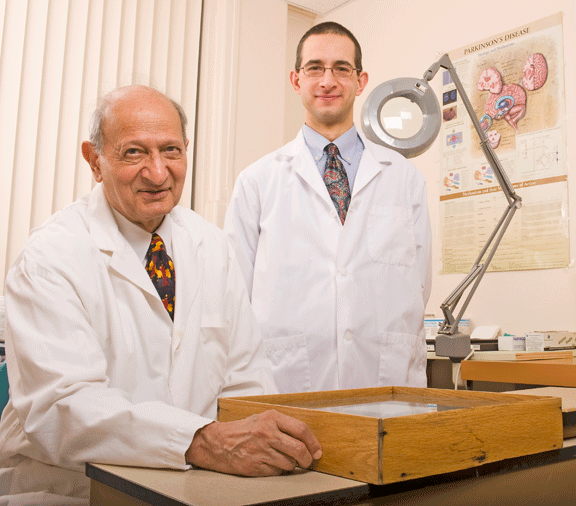Rajput part of abnormal Parkinson's gene discovery
An international team of scientists that includes University of Saskatchewan Professor Emeritus of Neurology Dr. Ali Rajput, a world expert who has been studying the disease for 45 years, has identified an abnormal gene that leads to Parkinson’s disease.
By University Communications "This discovery paves the way for further research to determine the nature of brain abnormalities which this gene defect produces," said Rajput in a news release. "It also promises to help us find ways to detect Parkinson's disease early, and to develop drugs which will one day halt the progression of the disease."
"This discovery paves the way for further research to determine the nature of brain abnormalities which this gene defect produces," said Rajput in a news release. "It also promises to help us find ways to detect Parkinson's disease early, and to develop drugs which will one day halt the progression of the disease."
The abnormal gene is a mutated version of a gene called DNAJC13, identified by University of British Columbia medical genetics professor Matthew Farrer, who led the study. Rajput and his son, fellow U of S neurologist and researcher Dr. Alex Rajput, are long-time collaborators of Farrer. The research team also includes scientists from McGill University, the Mayo Clinic in Florida, and St. Olav's Hospital in Norway.
The study involved 13 of 57 members of one extended Saskatchewan family who had been diagnosed with Parkinson's disease. Three other single cases from Saskatchewan and one family from British Columbia were also found to have the same mutation. All were of Mennonite background, a Christian group who share Dutch-German-Russian ancestry.
The findings were presented last week at the 16th International Congress of Parkinson's Disease and Movement Disorders in Dublin, Ireland.
A key contribution to the research is the Rajputs' collection of more than 500 brains and nearly 2,200 blood samples from Parkinson's patients. Farrer explains that confirmation of the gene's linkage with Parkinson's disease required DNA samples from thousands of patients with the disease and healthy individuals. He adds that the contributions of the Saskatchewan Mennonite family, who have asked to remain anonymous, were critical.
"The whole-hearted and unselfish commitment of this family is remarkable," Rajput says. "They went out of their way in every conceivable manner to help solve this mystery. We, on behalf of all the Parkinson's disease patients in this province, Canada, and around the world, are grateful to them for making this discovery possible."
Parkinson's disease is a progressive condition that causes symptoms such as tremors, slowness of movement, stiffness and mental impairment. In most cases, symptoms appear after age 40. It is estimated that about one million people in North America and more than four million people worldwide are affected by the disease.

